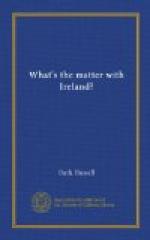Past an ancient Norman castle on which was whitewashed the legend “Up De Valera!” into the low-built little town of Ennis, I drove up to the modest colonial home that is called the “episcopal palace,” Bishop Fogarty invited me to take off my “wet, cold, ugly coat,” and to sit at a linen-covered spot at the long plush-hung library table. As he rang a bell, he told me I must be hungry after my drive. Then a maid brought in a piping-hot dinner of delicious Irish stew. I sat down quite frankly hungry, but from a rather resentful glance which the maid gave me, I have since suspicioned that I ate the bishop’s dinner.
First I told the bishop that I am a Catholic. Then I said I was informed that there was a reaction against the Church in Ireland, against being what American Protestants call “priest-ridden.” The first reason of the reaction, I was told, was the fact that the people felt that the hierarchy was not in favor of a republic. Indeed I had it from an Irish-American priest in Dublin that many of the Irish bishops were in a bad way, because neither the English government nor the people trusted them.
“Priest-ridden?” The bishop smiled. “Priest-ridden? England would like us to control these people for her today. We couldn’t if we would. Priest-ridden? Perhaps the other way about.”
The second reason, it was said, is due to the fact that the workers feel that the Church is standing with the capitalists. A Dublin Catholic, wife of an American correspondent stationed in that city, told me that socialism is so strong in the very poor parish of St. Mary’s pro-cathedral in Dublin that out of 40,000 members, there were 16,000 who were not practising their religion.
“A lie!” exclaimed the bishop as his jaw shot out and his great muscular frame straightened as if to meet physical combat on the score. “It is simply not true. The loyalty of the Irish to the Catholic Church is unquestionable.”
And anyway, he indicated, if the people desired a communistic government there is no essential opposition in the Catholic Church.
In the past, said the bishop, the Church in Ireland had thrived under common ownership. When in the fifth century Patrick evangelized Ireland, the ancient Irish were practising a kind of socialism. There was a common ownership of land. Each freeman had a right to use a certain acreage. But the land of every man, from the king down, might be taken away by the state. There was an elected king, and assemblies of nobles and freemen. There were arbitration courts where the lawgivers decided on penalties, and whose decisions were enforced by the assemblies. One of the reasons, the bishop said, that England had found it difficult to rule the Irish, was that she attempted to force a feudal government on a socialistic people.




